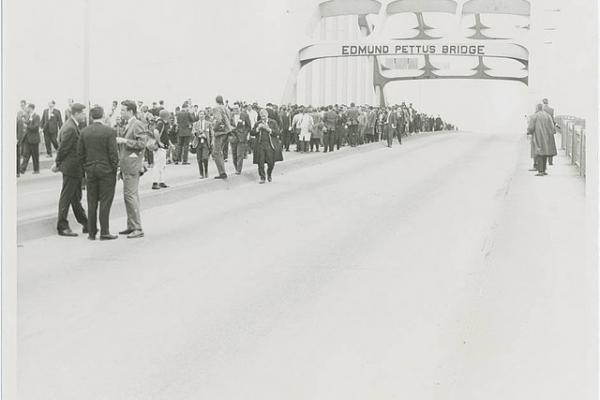The white ministers didn’t fly down to Alabama in January, when Sheriff Jim Clark clubbed Annie Lee Cooper outside of the county courthouse, nor in February when a state trooper fatally shot twenty-six-year-old Jimmie Lee Jackson in the stomach for trying to protect his mother after a civil rights demonstration.
But on Bloody Sunday everything changed. At 9:30 p.m. on March 7, 1965, ABC news interrupted a broadcast to show hundreds of black men, women, and children peacefully crossing the Edmund Pettus Bridge toward Montgomery and a sea of blue uniforms blocking their way. The marchers were given two minutes to disperse, and then the screen filled with the smoke of tear gas, police on horseback charging the screaming crowd, burly troopers wielding billy clubs and bullwhips, a woman’s hem rising up over her legs as a fellow marcher attempted to drag her away to safety.
Overnight the nation’s eye turned toward Selma. Rev. Martin Luther King sent a telegram to hundreds of clergy that Monday, urging them to leave their pulpits and join him in Alabama to march for justice. Some supporters, like the reporter George Leonard, packed their things immediately after watching the newscast from Selma.
“I was not aware that at the same momemt ... hundreds of these people would drop whatever they were doing,” Leonard wrote later.
“... That some of them would leave home without changing clothes, borrow money, overdraw their checking accounts, board planes, buses, trains, cars, travel thousands of miles with no luggage, get speeding tickets, hitchhike, hire horse-drawn wagons, that these people, mostly unknown to one another, would move for a single purpose to place themselves alongside the Negroes they had watched on television.”
Selma changed the course of history by paving the way for the passage of the Voting Rights Act, but its impact didn’t end there. The spirit of Selma rippled outward, forever changing those who made the long journey to Alabama — including a white minister from Washington, D.C., named Rev. Gordon Cosby.
Read the Full Article

